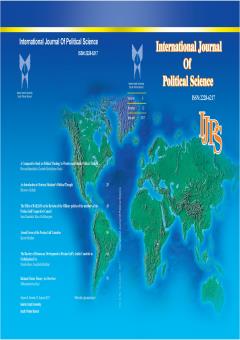Distributive Justice from the Perspective of Western and Islamic Thinkers
Subject Areas :
Habibullah Shahbazi Naroui
1
,
Masoud Mottalebi
2
*
![]() ,
Ghorbanali Ganji
3
,
Garineh Keshishyan
4
,
Ghorbanali Ganji
3
,
Garineh Keshishyan
4
![]()
1 - Department of Political Science, South Tehran Branch, Islamic Azad University, Tehran, Iran
2 - Department of Political Science, Central Tehran Branch, Islamic Azad University, Tehran, Iran
3 - Department of Political Science, Azadshahr Branch, Islamic Azad University, Azadshahr, Iran
4 - Department of Political Science, South Tehran Branch, Islamic Azad University, Tehran, Iran & Member of the Western Studies Research Institute
Keywords: Justice, Distributive Justice, Moderation,
Abstract :
Justice has long been a topic of interest and concern in human societies and among scholars. Justice can be considered the ultimate goal of government formation and has always been a fundamental necessity for the collective life of humans throughout history. Distributive justice, the focus of this study, oversees the government's responsibilities towards the people and determines the distribution of occupations, positions, and public wealth. The importance of distributive justice lies in achieving the acceptance of the ruling system and the satisfaction of citizens, leading to stability and the de-velopment of society in various dimensions of collective life, ultimately resulting in national pros-perity. This research aims to analytically and comparatively examine the perspectives of Western and Islamic scholars on distributive justice. The research method is of a library nature. The research findings indicate that distributive justice in the writings of various Western philosophers and think-ers can be found in one of the following four forms: distribution based on merit, distribution based on fairness, distribution based on need, and distribution based on the principle of equality. From the perspective of Islamic scholars, distributive justice emphasizes universal equality of humans, main-taining proportionality in everything, rejecting any form of discrimination, respecting all entitle-ments, equality in benefiting from Bait al-Mal, and belief in the equality of humans before the law.
Akhavan Kazemi, Bahram (2009). Interac-tions between Justice and Progress in Quranic Teachings. Islamic Gov-ernment Quarterly. No. 51.
Alam, Abdul Rahman (1998). History of Western Political Philosophy. Teh-ran: Office of Political and Interna-tional Studies.
Aliakbari, Ali Akbar (1998). Political Devel-opment from the Perspective of Imam Ali (AS). Unpublished PhD thesis, Institute for Humanities and Cultural Studies.
Bashiriyeh, Hossein (1997). The History of Political Thought in the Twentieth Century. Vol. 2. Tehran: Nashr-e Ni.
Booshti, Seyed Alireza (2000). Foundations of Epistemology of Social Justice. Tehran: Baqer.
Eivazloo, Hossein (2000). Investigation and Analysis of the Compatibility of Jus-tice and Efficiency Criteria in the Is-lamic Economic System. Un-published doctoral dissertation, Teh-ran, Tarbiat Modares University.
Enayat, Hamid (2011). Foundations of Polit-ical Philosophy in the West. Tehran: Winter Publications.
Gatri, W.K.C. (1996). History of Greek Phi-losophy. Pythagoras and the Pythag-oreans, translated by Mehdi Ghavam Safari, Tehran: Fekr-e Rooz Publica-tions.
Ghani Nezhad, Mosi (2001). Justice, Social Justice, and Economics, Reflections of Thought. No. 15.
Jamshidi, Mohammad Hossein (2001). Theo-ry of Justice. Tehran: Imam Kho-meini Research Institute.
Larijani, Mohammad Javad (1995). Religios-ity, Government, and Development. Contemporary Thought Cultural In-stitute.
Moahed, Mohammad Ali (2003). In the At-mosphere of Righteousness and Jus-tice. Tehran: Karnameh Publica-tions.
Motahhari, Morteza (1996). Divine Justice. Tehran: Sadra Publications.
Paya, Ali (2009). A Comparative Look at Imam Ali's Theory of Justice. Col-lection of Essays on Political Justice in Islam. Tehran: Cultural and So-cial Studies Research Institute.
Payandeh, Abolqasem (1998). Nahj al-Fasaha. Tehran: Javidan Publica-tions.
Qara'ati, Mohsen (2004). Interpretation of Noor. Tehran: Center for Cultural Studies Lessons from the Quran, Volume 1-12.
Rostami, Mohammad Zaman (2005). Justice from the Perspective of Islamic and Western Thinkers, Economic Essays. No. 4, pp. 113-136.
Rousseau, Jean-Jacques (1973). Social Con-tract. Translated by Manuchehr Kia, Tehran: Ganjineh Publications.
Sajjadi, Seyed Jafar (1979). Civil Politics. Tehran: Iranian Philosophy Associa-tion.
Saliba, Jalil (2014). Philosophical Culture. Translated by Manuchehr Sanaei Derbidi, Tehran: Hekmat Publica-tions.
Sayed Reza, Mohammad ibn Hussein (1972). Nahj al-Balaghah. Tehran: Nahj al-Balaghah Foundation.
Sayyid Qutb (1979). Social Justice in Islam. Translated by Sayed Hadi Khosrow-shahi, Qom: Dar al-Fikr.
Sen, Amartya (2013). Justice Thinking. Translated by Vahid Mahmoudi and Hormoz Humayun pour. Tehran: Kandou Kav Publications.
Shakouri, Ali (2016). Exploration of Social Justice Debates between Western and Islamic Thinkers. Quarterly Journal of Social Theories of Muslim Thinkers. Sixth Year, Second Issue, pp. 277-310.
Tafazoli, Fereydoun (1993). History of Eco-nomic Beliefs, From Plato to the Contemporary Period. Tehran, Nashr-e Ni.
Tamimi Amadi, Abdulwahid (1987), Ghorar al-Hikam va Durar al-Kalam, Beirut: Al-Alami Institute for Publications.
Yousefi, Hayatullah (2010). Political Re-sponsibility in Ibn Sina's Political Philosophy. Journal of Political Knowledge. Second Year, Second Is-sue.

